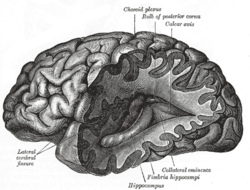Neurophenomenology
Neurophenomenology refers to a scientific research program aimed to address the hard problem of consciousness in a pragmatic way.[1] It combines neuroscience with phenomenology in order to study experience, mind, and consciousness with an emphasis on the embodied condition of the human mind.[2] The field is very much linked to fields such as neuropsychology, neuroanthropology and behavioral neuroscience (also known as biopsychology) and the study of phenomenonology in psychology.
The label was coined by C. Laughlin, J. McManus and E. d'Aquili in 1990.[3] However, the term was appropriated and given a distinctive understanding by the cognitive neuroscientist Francisco Varela in the mid-1990s,[4] whose work has inspired many philosophers and neuroscientists to continue with this new direction of research.
Phenomenology and neuroscience
Phenomenology is a philosophical method of inquiry of everyday experience. The focus in phenomenology is on the examination of different phenomena (from Greek, phainomenon, "that which shows itself") as they appear to consciousness, i.e. in a first-person perspective. Thus, phenomenology is a discipline particularly useful to understand how is it that appearances present themselves to us, and how is it that we attribute meaning to them.[5][6]
Neuroscience is the scientific study of the brain, and deals with the third-person aspects of consciousness. Some scientists studying consciousness believe that the exclusive utilization of either first- or third-person methods will not provide answers to the difficult questions of consciousness.
Historically, Edmund Husserl is regarded as the philosopher whose work made phenomenology a coherent philosophical discipline with a concrete methodology in the study of consciousness, namely the epoche. Husserl, who was a former student of Franz Brentano, thought that in the study of mind it was extremely important to acknowledge that consciousness is characterized by intentionality, a concept often explained as "aboutness"; consciousness is always consciousness of something. A particular emphasis on the phenomenology of embodiment was developed by philosopher Maurice Merleau-Ponty in the mid-20th century.
Naturally, phenomenology and neuroscience find a convergence of common interests. However, primarily because of ontological disagreements between phenomenology and philosophy of mind, the dialogue between these two disciplines is still a very controversial subject.[7] The influential critique of the ontological assumptions of computationalist and representationalist cognitive science, as well as artificial intelligence, made by philosopher Hubert Dreyfus has marked new directions for integration of neurosciences with an embodied ontology. The work of Dreyfus has influenced cognitive scientists and neuroscientists to study phenomenology and embodied cognitive science and/or enactivism. One of such cases is neuroscientist Walter Freeman, whose neurodynamical analysis has a marked Merleau-Pontyian approach.[8] However, recent trends on the matter appear to reject Dreyfus's interpretation of Husserl while at the same time maintaining a high interest in the integration of Husserlian phenomenology into the sciences of mind, as demonstrated by Evan Thompson's recent work.[9]
Neurophenomenologists
Probably the prominent thinkers who have skillfully combined phenomenological analysis with neuroscientific research are Francisco Varela and Walter Freeman. Both of these researchers had an important understanding about phenomenological philosophy that helped them better understand the biological basis of embodied cognition, and conversely, their neurobiological understanding helped them better understand phenomenological analysis of experience.
The psychiatrist and neurologist Erwin Straus was possibly the first neurophenomenologist. Other clinical influence on neurophenomenology comes from the work of Alexander Luria, and the writings of Antonio Damasio on the role of embodiment on cognition.[10] Certain neurophenomenological research groups, such as the Biogenetic Structuralism group, suggest that invariant patterns and structures discovered in first-person explorations of consciousness may find their explanation in the physiology and functioning of the brain.
See also
- Embodied cognition
- Francisco Varela
- Hubert Dreyfus
- Walter Freeman
- Antonio Damasio
- Biogenetic structuralism
References
- ↑ D. Rudrauf, A. Lutz, D. Cosmelli, J.-P. Lachaux, M. Le Van Quyen. "From autopoiesis to neurophenomenology: Francisco Varela's exploration of the biophysics of being", Biol Res 36: 21-59, 2003.
- ↑ Gallagher, S. 2009. Neurophenomenology. In T. Bayne, A. Cleeremans and P. Wilken (eds.), Oxford Companion to Consciousness (470-472). Oxford: Oxford University Press.
- ↑ C. Laughlin, J. McManus and E. d'Aquili: Brain, Symbol and Experience: Toward a Neurophenomenology of Consciousness (New York: Columbia University Press)
- ↑ Varela, F. 1996. Neurophenomenology: A methodological remedy for the hard problem. Journal of Consciousness Studies 3: 330-49.
- ↑ Stanford Encyclopedia of Philosophy: Phenomenology
- ↑ Gallagher, S. and Zahavi, D. 2008. The Phenomenological Mind. London: Routledge, Chapter 2.
- ↑ Husserl himself was very critical towards any attempt to "naturalizing" philosophy, and his phenomenology was founded upon a criticism of empiricism, "psychologism", and "anthropologism" as contradictory standpoints in philosophy and logic. Debate Between D. Chalmers and D. Dennett: The Fantasy of First-Person Science
- ↑ Hubert Dreyfus 'Intelligence Without Representation: Merleau-Ponty's Critique of Mental Representation'
- ↑ "Evan Thompson. 'Mind in Life: Biology, Phenomenology, and the Sciences of Mind. Belknap, Harvard. 2007'"
- ↑ "A. Damasio. 'The Feeling of What Happens: Body and Emotion in the Making of Consciousness'"
External links
| Wikibooks has a book on the topic of: Consciousness studies |
- Phenomenology and Cognitive Sciences
- Eugenio Borrelli page: Phenomenology and Cognitive Science
- Stanford Encyclopedia of Philosophy: Phenomenology
- Francisco Varela's Articles on Neurophenomenology and First person Methods
- Michael Winkelman
- http://www.neurophenomenology.com
- Hubert Dreyfus 'Intelligence Without Representation: Merleau-Ponty's Critique of Mental Representation'
- Debate Between D. Chalmers and D. Dennett: The Fantasy of First-Person Science
Further reading
- B. Andrieu. "Brains in the flesh: Prospects for a neurophenomenology". Janus Head 9: 135–155, 2006.
- D. Rudrauf, A. Lutz, D. Cosmelli, J.-P. Lachaux, M. Le Van Quyen. "From autopoiesis to neurophenomenology: Francisco Varela’s exploration of the biophysics of being", Biol Res 36: 21–59, 2003.
- J. Petitot, F. Varela, B. Pachoud, J-M Roy eds. "Naturalizing phenomenology. Issues in contemporary phenomenology and cognitive science", Stanford University Press, Stanford (California), 1999.
| ||||||||||||||||||||||
